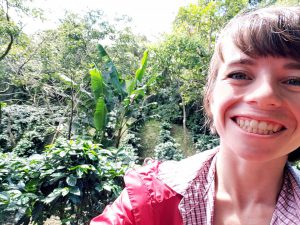I’ve toured all kinds of coffee farms now, from small scale to mass production. One thing that amazes me is the intense awareness of sustainability the country of Costa Rica has. The country has created rules and regulations to ensure that Costa Rica is on its way to become a carbon neutral country –and this includes the coffee industry.
To begin to understand how sustainability plays a role in the production of coffee you must first understand the process! Coffee is grown on small trees, and found as the pit in the coffee cherry. The cherries must be de-pulped in a chunkador to access the bean. In short, the bean is dried and stored, the parchment protection layer is removed (hulling), and then it is roasted and ground! So, in these three basic steps how do we see sustainability in action?
- The de-pulping process: The coffee bean is only about 40% of the mass of the whole coffee cherry. When this pulp is removed to access the bean, the chunkador machine sends the beans to a basket or for further processing and makes a pile of pulp. The farmers or processers take this pulp to create a compost that gets returned to the crop. Sometimes mixed with poultry litter and sometimes directly applies, this application of organic material not only helps recycle the nutrients to keep a healthy soul, but it also keeps incredible volumes of waste out of landfills.
- The drying process: Coffee beans must be dried down to about a 10% moisture content before they are ready to be stored. The most common way for beans to be dried is naturally by the sun! This way of drying has the beans on mesh beds or a blacktop for about a week, being turned and letting the sun do the work. Machines do exist to dry the beans, but most farmers I had the chance to meet with preferred to dry them naturally.

- The hulling process: The last step to reach the final product, the parchment layer must be removed from the bean. This papery layer is then used as fuel for roasting or recycled into paper!
The sustainability effort extends beyond the bean. I was able to have the chance to farmers local to the Monteverde region, and many of them discussed the importance of taking care of their land. They frequently chose to use an organic or nearly organic growing practice, even when it resulted in less yield and profit. Choosing not to use harsh chemicals is a choice they make to protect their local ecosystems and personal health. Some of these farmers also practice social sustainability, giving back and supporting to their community. No matter what level what level of effort these farmers are putting in, one thing is for sure… the coffee farmers of Costa Rica have demonstrate a unique commitment to protecting their land and taking care of it for generations to come.

